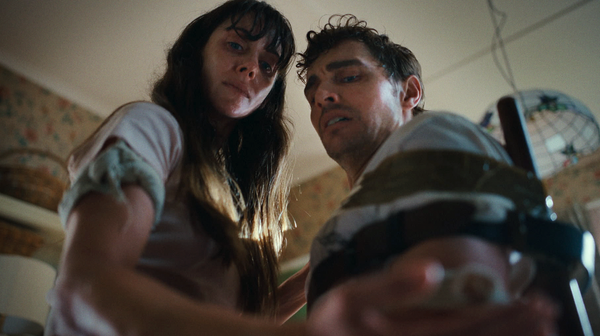In this review, Lauren Gallagher labours over thoughtful drama Die My Love.
It’s been eight years since Lynne Ramsay’s last feature, You Were Never Really Here, and she’s back on familiar ground with her newest film. Die My Love is an unflinching but remarkably tender study of motherhood, domesticity and intimacy. The script was adapted by Ramsay, Alice Birch and acclaimed Irish playwright and screenwriter Enda Walsh. It finds the director returning to source material familiar to her previous work, reflecting similar themes seen in We Need to Talk About Kevin and Morvern Callar. As always, Ramsay explores tensions within family units with a deep sense of compassion.
Jennifer Lawrence gives one of her finest performances to date as Grace, a writer suffering from creative stagnation. She’s a new mother, living with her husband Jackson (Robert Pattinson) and their infant son in Jackson’s family home in rural Montana. In this family unit, Grace is practical and serious, whereas Jackson is somewhat carefree. While Grace organises the cleaning, Jackson imagines filling the empty space by buying a drum kit. Jackson complains when he sees a rat, but it’s left to Grace to suggest a solution: getting a cat. Despite their clashes, these early moments are playful and affectionate, laughing and tickling each other before having sex on the grubby floor of their new home. After the baby’s arrival, this intimacy begins to fracture.
In one of the film’s most striking sequences, Jackson remains asleep in bed as Grace wakes in the night to breastfeed the baby. Afterwards, she leaves the baby’s room, and instead of returning to bed, she goes into her study. This is a space that Jackson suggested she use for her writing. There, she stares at a blank page, then flicks ink onto the paper. As she absent-mindedly toys with the ink, she watches her breast milk drip onto the paper, these two vital fluids mixing together. This is a haunting visual metaphor, as she laments the writer she once was, the mother she has become, and the multifaceted woman she is afraid of losing. And yet, instead of melodrama, Grace’s unravelling is painfully authentic.
As her mind fractures, Grace’s behaviour becomes increasingly erratic. She drinks during the day, accuses Jackson of cheating on her, and spends much time alone outside, stalking through the long grass in the garden like a predator. Ramsay films these moments not for shock value but for understanding. Grace’s psychosis becomes a physical expression of a life she no longer recognises: confined to a house that isn’t hers and surrounded by people who love but cannot reach her.
Jackson, meanwhile, is by no means a traditional villain, yet it cannot be denied that he tries. He paints her toenails, cuddles her in bed, and when Grace is hospitalised, he deep cleans and paints the house, takes over sole care of the baby, and supports his grieving mother (Sissy Spacek). Ramsay resists the easy stereotype of the negligent husband or overbearing mother-in-law; instead, every character on screen is raw and layered.
Lauded Irish cinematographer Seamus McGarvey shot the film in Montana (filmed in Alberta) with hallucinatory excellence, noting Rosemary’s Baby and Repulsion as inspirations. He manages the difficult task of capturing plains that are vast and open as being somehow also alienating and isolating. In his accomplished career, McGarvey has garnered many accolades, including six IFTA wins, three BAFTA nominations and two Academy Award nominations. He lends his talented eye to the production, with heightened visuals mirroring Grace’s distorted reality as she slips further into paranoia.
The film could have been an easy entry into the canon of postpartum horror, but Ramsay reshapes it into something more complicated: a darkly comic love story. Amid the bleakness, there is humour and sensitivity — Jackson’s patient affection, Grace’s absurd and ill-timed attempts to rekindle desire, even her surreal fantasies of escape. Lawrence balances mania and fragility with impeccable control, resembling earlier performances in Mother! and Silver Linings Playbookwhile grounding the character in sincerity.
At its core, Die My Love celebrates the complexities of existence — for Grace, Jackson, their child, their extended families, and for anyone watching dealing with an unnameable grief. The film carves out flashes of beauty and honesty in stifling discontent, turning heightened domestic despair into something so universal. Bleak, candid and profoundly patient, Die My Love is a story of contradictions that gives grace to both tenderness and destruction.
Die My Love is in cinemas 7th November 2025.




